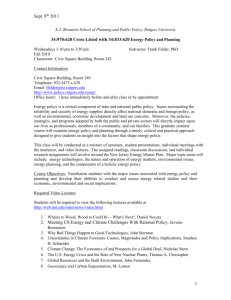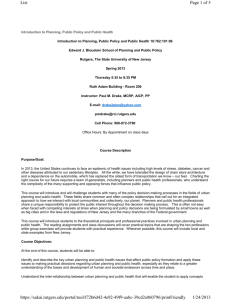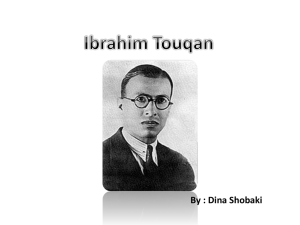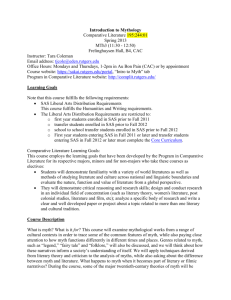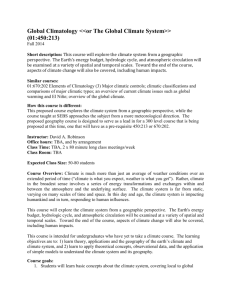War and Literature in the Arab World
advertisement
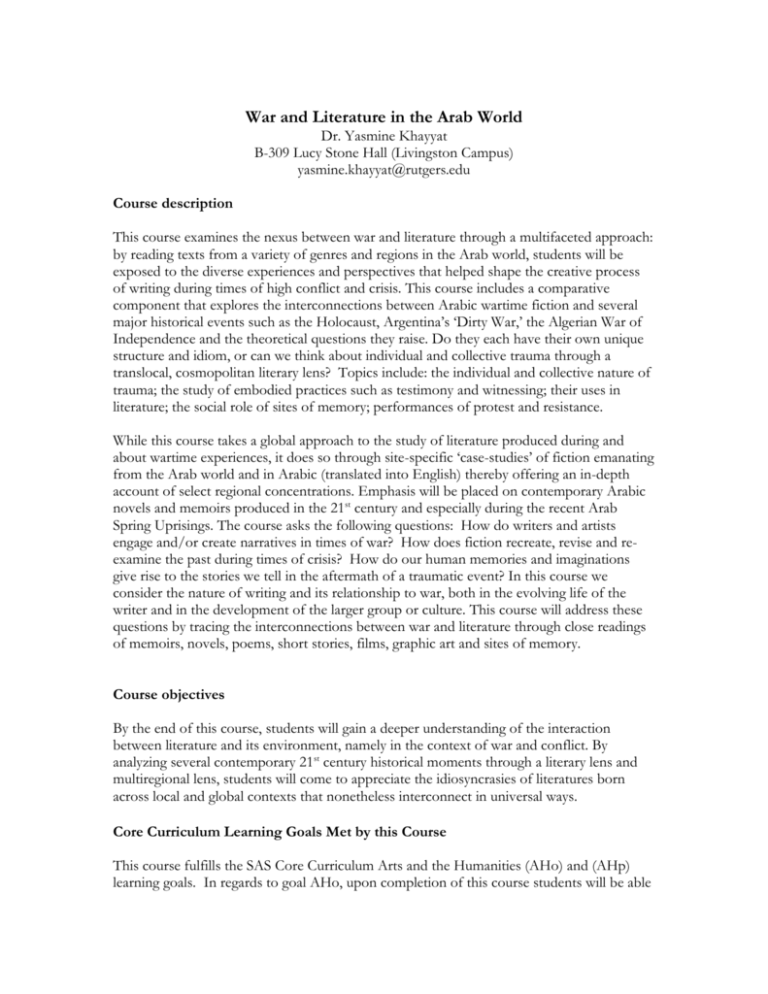
War and Literature in the Arab World Dr. Yasmine Khayyat B-309 Lucy Stone Hall (Livingston Campus) yasmine.khayyat@rutgers.edu Course description This course examines the nexus between war and literature through a multifaceted approach: by reading texts from a variety of genres and regions in the Arab world, students will be exposed to the diverse experiences and perspectives that helped shape the creative process of writing during times of high conflict and crisis. This course includes a comparative component that explores the interconnections between Arabic wartime fiction and several major historical events such as the Holocaust, Argentina’s ‘Dirty War,’ the Algerian War of Independence and the theoretical questions they raise. Do they each have their own unique structure and idiom, or can we think about individual and collective trauma through a translocal, cosmopolitan literary lens? Topics include: the individual and collective nature of trauma; the study of embodied practices such as testimony and witnessing; their uses in literature; the social role of sites of memory; performances of protest and resistance. While this course takes a global approach to the study of literature produced during and about wartime experiences, it does so through site-specific ‘case-studies’ of fiction emanating from the Arab world and in Arabic (translated into English) thereby offering an in-depth account of select regional concentrations. Emphasis will be placed on contemporary Arabic novels and memoirs produced in the 21st century and especially during the recent Arab Spring Uprisings. The course asks the following questions: How do writers and artists engage and/or create narratives in times of war? How does fiction recreate, revise and reexamine the past during times of crisis? How do our human memories and imaginations give rise to the stories we tell in the aftermath of a traumatic event? In this course we consider the nature of writing and its relationship to war, both in the evolving life of the writer and in the development of the larger group or culture. This course will address these questions by tracing the interconnections between war and literature through close readings of memoirs, novels, poems, short stories, films, graphic art and sites of memory. Course objectives By the end of this course, students will gain a deeper understanding of the interaction between literature and its environment, namely in the context of war and conflict. By analyzing several contemporary 21st century historical moments through a literary lens and multiregional lens, students will come to appreciate the idiosyncrasies of literatures born across local and global contexts that nonetheless interconnect in universal ways. Core Curriculum Learning Goals Met by this Course This course fulfills the SAS Core Curriculum Arts and the Humanities (AHo) and (AHp) learning goals. In regards to goal AHo, upon completion of this course students will be able to critically evaluate philosophical and theoretical issues concerning Arabic literary expressions of memory, war, nostalgia, and imagination as seen through novels, film, essay writing, lyric poetry, drama, the novel, and the short story. In regards to goal AHp, students will be able to analyze the production and continuation of several canonical Arabic literary traditions in relation to their specific historical, cultural contexts. This course also fulfills 21st Century Challenges learning goal [21c]. By reading selected fictions from a variety of regions and languages (in English translation) students will enrich their understanding of the ways in which global conflict shapes an author’s experience of literature and perspective on his/her surrounding environment. Students will also gain an understanding of larger global questions of war and the creative process through local contexts by following the interconnections between war and literature as it migrates across national borders and languages since this course draws from classic and recent readings at the juncture of literature, war and memory. Required Texts Course readings uploaded to the Sakai course website at https://sakai.rutgers.edu/portal --Huyssen, Andreas. Present Pasts: Urban Palimpsests and the Politics of Memory. Cultural – Memory in the Present. Stanford, Calif.: Stanford University Press, 2003. --Kanafani, Ghassan, Barbara Harlow, and Karen E. Riley. Palestine's Children : Returning to Haifa & Other Stories. Boulder, CO: Lynne Rienner, 2000. --Mosteghanemi, Ahlem. Memory in the Flesh. Cairo, Egypt: The American University in Cairo Press, 2000. --Sacco, Joe. Footnotes in Gaza. London: Jonathan Cape, 2009. --Yazbik, Samar, and Max Weiss. A Woman in the Crossfire : Diaries of the Syrian Revolution. London: Haus Pub., 2012. --Cathy Caruth, Unclaimed Experience: Trauma, Narrative, and History Course Requirements Attendance: Each student is allowed two unexcused absences for the semester, after which a letter for each additional unexcused absence will lower your attendance grade. This means that your attendance grade will drop to a B if you miss three classes and to a C if you miss four classes, and so forth. If you expect to miss one or two classes, please use the University absence reporting website https://sims.rutgers.edu/ssra/ to indicate the date and reason for your absence. An email will automatically be sent to me. Excused absences include religious holidays (please notify me in advance), family emergencies, transportation emergencies, health emergencies, and scheduled visits to the doctor (in which case, students should bring a note from their doctor). Students who find themselves needing to be excused for a long period of time for medical or other reasons should contact their college dean and ask the dean to notify all their professors of their absence. Participation: As class participation is a requirement of this course, students must come ready to discuss the texts chosen for that day. Not having read the assigned texts for class is equivalent to an absence. Please make sure to have ordered and received all the relevant texts in time for the start class. Tardiness, inattention, and not participating actively detract from the learning experience of others and will not be tolerated. Participation is assessed through your in-class questions and comments, completion of inclass quizzes and exercises, small group work, and office hour visits. Reading Responses: Each week you will hand in a short (1 page) response paper to the reading. The purpose of these responses is to help you engage critically with the readings and to formulate questions and ideas that will inspire both class discussions, as well as your paper writing process. Each response must discuss one or more of the readings for the upcoming class and will be handed in at the beginning of class. No late responses will be accepted. Oral Presentation: Each student will give one 10-minute oral presentation over the course of the semester. The presentation should engage with all the readings assigned on that day, discussing their main arguments, and raise one or two guiding questions for class discussion. I strongly encourage you to come talk to me during office hours before your presentation day. Midterm: There will be one in class midterm exam organized around several short-answer essay questions. Final Paper: There will be one short final paper of 5-7 pages. In advance of this paper, you will hand in an outline of your argument and supporting claims. Late papers will lose one letter grade for each week they are submitted after the deadline. Sakai You are expected to check the Sakai site for the course as I may post additional readings, revisions to the syllabus, and course announcements. Grading Attendance/Participation: Reading Responses: Oral Presentation: Midterm: Final Paper (5-7 pgs.): Extra Credit 20% 20% 10% 20% 30% (including Outline and Annotated Bibliography) You may receive extra credit (up to 2% of your final grade) by attending literature oriented extra-curricular events scheduled throughout the term. To obtain extra credit, you must 1) receive approval from me for the event in advance of the event, 2) write a one-page summary of the event, and 3) prepare a list of 4-5 critical questions prompted by the event that relate to this course. You may exercise this option only once per term. Plagiarism Rutgers University views plagiarism as a very serious offense. Plagiarism is the use of another person’s words, ideas, or results without giving that person appropriate credit. To avoid plagiarism, every direct quotation must be identified by quotation marks or appropriate indentation and both direct quotation and paraphrasing must be cited properly. Some common examples of plagiarism include copying something word for word (from an oral, printed, or electronic source) without proper attribution, paraphrasing without proper attribution, or submitting a purchased, downloaded, or one’s own already-submitted paper. Cases of plagiarism will be pursued following university regulations, which can be found at http://academicintegrity.rutgers.edu/integrity.shtml. Wikipedia and other non-peer reviewed websites are not acceptable sources for papers and reading responses. Use of Electronic Devices Computers, cell phones, and all other technological devices (beepers, iPods, MP3 players, etc.) must be turned off during class out of respect for the instructor and fellow students. Disability Support Services Students who may be requesting accommodations due to disabilities are encouraged to familiarize themselves with procedures and policies regarding disability support services at the following website: http://disabilityservices.rutgers.edu/. It is recommended that students seeking accommodations begin filing paperwork as soon as possible as the documentation review process may take up to 30 business days. Students are encouraged to speak with teachers about these issues at the beginning of the term. All such conversations will be kept strictly confidential. Reading Schedule Please note that the following reading schedule may change according to the pace and interests of the class. Week 1 Introduction to the course Week 2 Case study: Writing War Across Paradigms Read: Jacobo Timmerman, Prisoner without a Name Selections from Alicia Partnoy, The Little School Week 3 Staging Trauma and Transmission Read: Primo Levi, Survival in Auschwitz, Read “Shame” View: Anthony Sherr, Primo Week 4 Social role of sites of war and memory—Auschwitz, Campo Atlético, ESMA. Read: James Young, The Texture of Memory, Intro and chpt 5 Andreas Huyssen Present Pasts (chpts. 1, 2) Literary Case studies from the Middle East Week 3 Palestine: Literature and Ongoing War(s) Read: --Khoury, Elias. “The Memory of the City” in The Novel, the Novelist and the Lebanese Civil War. --Ghassan Kanafani “Returning to Haifa” in Palestine's Children: Returning to Haifa & Other Stories. Week 4 Read: --Joe Sacco, Footnotes in Gaza. “Foreword” and pp. 30-60. --Listen to interview with Elias Khoury (select the full interview) “The Key to Memory: An Interview with Elias Khoury” http://www.opendemocracy.net/artsLiterature/khoury_3462.jsp --Required background reading: Makdisi, Ussama Samir, and Paul A. Silverstein. Memory and Violence in the Middle East and North Africa. Bloomington: Indiana University Press, 2006. Print. Read “Introduction” and pp. 1-24. Week 5 Read: -- Abu Loghud, Lila, “The Return to Half-Ruins: Memory, Postmemory, and Living History in Palestine” in Nakba: Palestine, 1948, and the Claims of Memory. Week 6 Watch: --Film Screening “The Time That Remains” (2012, 109 minutes), Arabic with English Subtitles. Directed by Elia Suleiman. Week 7 Read: --Makdisi, Saree. “The Architecture of Erasure.” Critical Inquiry, Vol. 36, No. 3 (Spring 2010), pp. 519-559. Week 8 Iraq: Of War and Memoirs Read: --Noha al-Radi, Baghdad Diaries. Selections. -- http://riverbendblog.blogspot.com Week 9 Algeria: Literary and Filmic lenses of War Read: -- Mosteghanemi, Ahlem. Memory in the Flesh. Modern Arabic Writing. Cairo, Egypt: The American University in Cairo Press, 2000. Pp. 1-80. Week 10 Read: --Film Screening: Pontecarvo, “The Battle of Algiers” (1966). --Benjamin Stora, “The Algerian War in French Memory” in Memory and Violence in the Middle East, p: 151-174. Lebanon: War and the Challenge of Fiction Week 11 Read: --Sune Haugbolle, War and Memory, “Prologue: A Hiatus of History” p: 1-28. --Darwish, Mahmud, and Ibrahim Muhawi. Memory for Forgetfulness : August, Beirut, 1982. Berkeley, Calif.: University of California Press, 1995, pp. 1-40. Week 12 Read: --Haugbolle, Sune. War and Memory in Lebanon. Cambridge Middle East Studies. New York: Cambridge University Press, 2010. Selections. -- Selections Pamuk, Orhan, and Maureen Freely. Istanbul: Memories of a City. London: Faber and Faber, 2005. Week 13 The Arab Spring: Revolution and Spontaneous Creativity Read: --Samar Yazbek, A Woman in the Crossfire: Diaries of the Syrian Revolution. --Background reading: Gelvin, James L. The Arab Uprisings : What Everyone Needs to Know. New York: Oxford University Press, 2012. Selections. --Review of course --Final papers due


